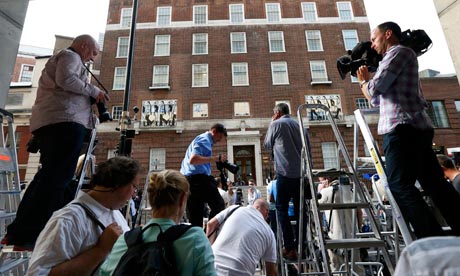Yesterday our frenzied response to Kate Middleton — dubbed “brilliant” for giving birth to a boy — has exposed just how dissatisfied we are with our personal life stories.
It is not entirely unfathomable that many people would feel a sense of excitement that Kate Middleton has given birth to the third heir to the throne. After all, as social storytelling beings we make meaning of the world, create relationships and derive inspiration from the lives of others. In addition to being perfectly normal — it is healthy and a part of our collective history. Since the beginnings of humankind we’ve sataround fires in the middle of forests, in caves, atop mountains, and at the mouth of rivers sharing stories of great individuals — mostly male monarchs, warriors and magicians — on epic journeys. These stories created wander, helped to explain a mystifying world and engendered a sense of possibility. However, our current preoccupation with the life stories of others — especially rich and famous others like Kate Middleton — has become a social phenomenon.
That’s right — scholars have actually developed psychometric tools designed to measure how technology has widened the window into the lives of famous people. They’ve even created scales that capture how superficially inserting ourselves into the lives or at least online networks of famous people impacts group behaviours, feelings of self worth and daily habits. This research along with my own narrative analysis, has led me to explore this dangerous preoccupation with the life stories, often manufactured and edited, of famous people.
Although North Americans are extraordinarily privileged in that we can actively shape and if needed, completely re-imagine our personal life stories, we tend to squander this powerful social capital. This is a shame given that so many people around the world simply lack the education, health care, safety and time to contemplate anything other than surviving in the rigid, and oftentimes oppressive, social roles they’ve been casted in. Yet, with all of our storytelling power, we’ve avoided dealing with our personal life stories. Instead, we’ve opted to get lost in contemporary myths — reality television, celebrity tweets and opportunistic autobiographies.
Why?
Well firstly, I think that we’ve grown increasingly disconnected from each other. In previous years our first and most influential storytellers we our elders — parents, grandparents and neighbours. They regaled us with compelling tales of crossing the ocean in search of opportunity, rituals practiced in the solitude of nature, and unrequited first love. Intergenerational bloodlines were the channels through which our stories were transmitted. Today we have access to a multiplicity of communications channels. We’re also experiencing increased disconnection from our elders and neighbours. This has led to a real loss of community, and consequently, the stories that helped to shape our individual and collective identities.
The other factor that may be contributing to the time and emotional investment that we place in the stories of famous people is a lack of self worth. Many early stories focused on the creativity, resilience, integrity and courage of the every day person.
We used to be a culture that cheered for protagonists like David who dared to battle Goliath, Rosa Parks who refused to sit at the back of the bus, Helen Keller who overcame her disabilities to become the first deaf/blind person to earn a Bachelor of Arts degree, and the late Jack Layton who came back from cancer as a fierce political contender. The fact that we have replaced our every day heroes with monarchs, athletes and celebrities suggest that we have lost faith in ourselves and our ability to create a better world.
This is perhaps where the real challenge lies. We are constantly pummelled with tragedies and political unrest so it is no wonder that many of us have opted to float about in the imaginary world of famous people. Focusing on our own life stories and tackling personal, community and global issues is not nearly as entertaining as following celebrity tweets. It can be hard and sometimes disheartening work. Many of us are simply too beat to spin new tales of every day protagonists advocating for justice, stewarding the environment and championing the rights of children.
Being overwhelmed and tuning in to juicy tidbits of celebrity escapades is natural. But have we lost so much faith in ourselves and our stories that we’d prefer to place our hope in this newborn king?
Jay Pitter is a senior marketing communications specialist and narratologist. With a Master’s Degree in Narrative Theory and Methodology, Jay investigates “story” as a communicative mode, data, art form, economy and social discourse. Her writing credits include CBC Radio, the Toronto Star, Walrus Magazine, Spacing Magazine, Fireweed, Sister Vision Press, TVO and the book Climate Change: Who’s Carrying the Burden?




